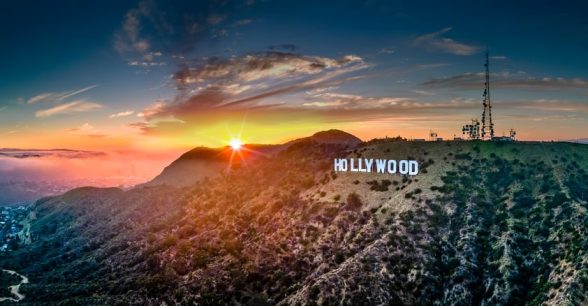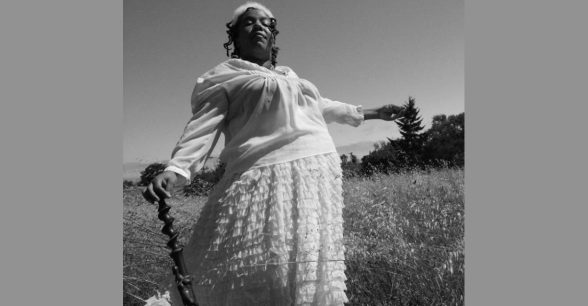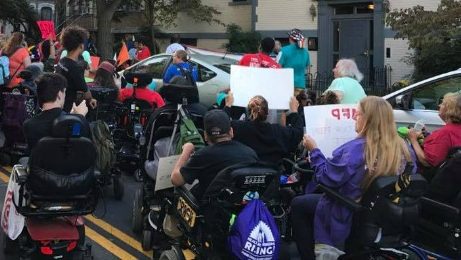A Community Reflection on Disability Pride Month
The way that individual people connect to their disability—whether it’s mental, physical, learning, or developmental; chronic and/or dynamic; congenital or acquired—is complex. We live in a society that was not created with disabled people in mind. It’s evident every time we try to find an apartment or a doctor that understands and respects our conditions.
How do we deal with constantly being made to feel less than? We create spaces for ourselves. We foster a sense of pride around how we navigate the world. We build community around our shared experiences. Disability pride is a beautiful jewel crafted from unlearning ableism and embracing the good with the bad, recognizing the humanity that all people possess just by existing.
That’s why it hurts so much when we see companies that don’t have any insight from the community celebrating “disability pride.” It often feels like they just want to capitalize on Disability Pride Month. Where are these major companies when our healthcare gets attacked? Why do these companies only showcase certain kinds of disabilities and not others or only highlight white, cisgender people?
As a Queer woman, I’ve seen how corporate support twists Pride. LGBTQ+ Pride parades are great, but it sucks that so many of our corporate sponsors are alcohol companies, when generations of Queer and Trans people have relied on alcohol as a way to self-medicate from constant harassment and societal exile.
I don’t want that to happen to disability pride. It’s important that we address these issues now, to build the kind of future that we want to see. We must decrease generational trauma and self-loathing, not only in younger generations but support for self-acceptance and introspection in older disabled people as well.
The opportunity to control our narrative around our pride is an endeavor that should be tackled as a community. It’s not just so that nondisabled people feel more comfortable with us; that won’t bring true liberation and change. It’ll just make oppression against people who don’t fit their narrow view of productive members of society more palatable. So, I brought together people willing to be vulnerable enough to start conversations in our community.
I interviewed three different people from various backgrounds, life experiences, disabilities, and ways of thinking. But there was a common thread that could not be ignored: let disabled people take the lead. Let disabled people define what “disability pride” is for themselves because it’s such an individualistic and internal thing.
Of course, it would be easier to show a one-dimensional ad with a wheelchair user smiling as a friend pushes them up a ramp. But the world is messy and complex. Barriers related to disabilities are often not cut and dry; many of them are attitudinal and generational. It takes real effort and hard conversations to help people unlearn those types of things.
Some people aren’t ready to have those conversations. Non-disabled people, as all people with social privilege, often like to center themselves in conversations about oppression. It’s true that Disability Pride can be an opportunity for somebody without a disability to better understand our realities. But that is a bonus, not the focus. The focus should be about building community and support, so every generation that comes after us doesn’t have to experience the same feelings of isolation and self-loathing.
Focusing on community requires recognizing that we aren’t all in the same place on our journeys. Some of the people who aren’t “ready” to have these conversations are also disabled. As Patt Harris (he/him/his), disability and trans community advocate and founder of Access Inclusion Advancement Project pointed out: “Making a mission statement about what disability pride aims to do for its community” is an important step toward amplifying its message. Communication about disability pride’s goals and who they benefit is crucial to building this movement. We can’t afford to leave people behind; everyone has a place.
But when we allow nondisabled people to dictate how our images and stories can be used, it’s usually for their benefit rather than the disability community. It often feels like we have to trade our dignity for a bit of recognition, in the hope that greater exposure will lead to change for our community.
So, we have to push past surface level representation. Harris emphasizes the importance of showcasing a dynamic understanding of our community: “Teach the history of the disabled movement and show the progress that disabled people [have made over the years.” Disabled people need to be in positions of influence and control to educate others about the changes that need to happen in the world. We need to take the spaces that are rightfully ours, to honor where we’ve been, celebrate where we are, and fight for where we want to go.
We aren’t saying that we can do it alone; marginalized groups often create change through collaboration. However, we must stop treating disabled people like props, used to pull on people’s heartstrings and to make corporations seem more caring. We are tired of the same old recycled tropes. We deserve and demand better.
Disability pride, to me, is just a stepping stone into deeper waters. What if we asked for what we needed instead of only taking the crumbs that we’re thrown? What if we didn’t care as much about being liked and accepted? What if, instead, we demanded that society center respecting our boundaries, even when we aren’t happy-go-lucky and appeasing 24/7?
And we’re not trying to be difficult by dictating how we want to be treated. Isn’t that something that all people should have the ability to do? Obviously, disabled people should be held to the same standards as others when it comes to learning about, respecting, and listening to other marginalized and oppressed groups, but it’s a two-way street.
As disability pride becomes a more well-known concept, there’s a troubling trend where disabled straight, cisgender people comment on the “unfairness” of LGBTQ+ pride events being so well-attended and global. It’s not a competition to see who can get to the bare minimum first. Queer and trans people just don’t want to be murdered or abandoned by our loved ones.
That pride events are necessary for anyone is just a response to systemic oppression. My hope is that we can organize together toward ending our oppression, so that we can have true freedom and more moments of joy.
Additionally, there is so much overlap between disabled and LGBTQ+ people that shouldn’t be ignored. For those of us who exist with both identities simultaneously, navigating life can be really difficult. Priscilla Gutierrez-Wong (they/them), social activist and lifelong learner, reflected: “Allocishet disabled people should be able to celebrate pride in their disabled bodies while still acknowledging that they hold privilege as cisgender, heterosexual, [allosexual/romantic] folks with disabilities.” It’s a balancing act of respect and understanding. We shouldn’t have to choose between which pride is the most needed; the truth is they both are.
It’s not a competition. We know that true liberation will not be possible unless we openly accept all people pushed to the margins of society. Queer and Trans disabled people having our own spaces and celebrations does not take away anything from disability pride as a whole.
Disability Pride Month is a relatively new thing in mainstream media. We have the ability to set the tone of what’s acceptable if corporations want to “celebrate” disability pride. I don’t believe that we can stop them, but we can make sure that they do so in a respectful manner that uplifts all of the disability community. From the inception of these projects, disabled people must be put in positions of power to make sure that harmful images and stories are not perpetuated for profit.
If we stop supporting the bare minimum, they’ll have to step their game up. Take what you’ve learned here and realize that the disability community deserves more than the scraps we get thrown. It’s okay to question and analyze the representation that you see in the world.
The importance of disability pride and what it can do for our community is summed up in a beautiful vision from Gutiérrez-Wong: “I’d love if Disability Pride Month would…highlight how diverse [we are], how resilient we’ve always been—not because it’s easy for us, but because we have always existed in a world not designed for us. [I also hope that it’ll] continue to promote active discourse on how…to dismantle the continued barriers, personal biases, and discriminatory practices directed at disabled folks.”
I want disability pride to be beautiful but complex and messy, where we can hold the joy and the pain of disability in the same space. So that, no matter where you are in your journey to embracing your whole self, there is room for you. It has to be more than quippy social media campaigns selling cosmetics or car insurance. I want it to hold oppressive and disabling systems accountable for the suffering that they cause. I want people to stop claiming ignorance as a reason for treating disabled people as less than.
I want disability pride to be a time for us to celebrate our dead, innocents taken by capitalistic greed and selfishness that will never see the seeds that they planted bloom into a better world. I crave a society where people don’t have to spend months of their lives fighting for necessities to navigate these harsh and unwelcoming conditions. We can have that world if we spread disability pride and continue to have uncomfortable conversations.
About Rooted In Rights
Rooted in Rights exists to amplify the perspectives of the disability community. Blog posts and storyteller videos that we publish and content we re-share on social media do not necessarily reflect the opinions or values of Rooted in Rights nor indicate an endorsement of a program or service by Rooted in Rights. We respect and aim to reflect the diversity of opinions and experiences of the disability community. Rooted in Rights seeks to highlight discussions, not direct them. Learn more about Rooted In Rights




I appreciate you pointing out how complicated it is for each individual to relate to their handicap, regardless of whether it is mental, physical, learning, developmental; dynamic or chronic; inherited or acquired. This reminds me of my boyfriend’s sister, whom I want to assist in finding activities appropriate for her impairment because I want to make sure she can live life to the fullest in spite of her struggles. I suppose all I want to do is make her life more inclusive and satisfying.